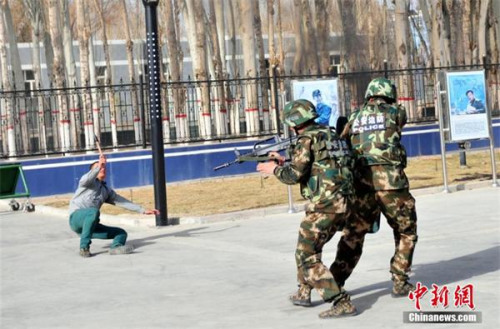
Police attending an anti-terror drill aim at a suspect at a border police station Xinjiang in this April, 2014 file photo. (Photo/Chinanews.com)
International terrorist organizations are subverting traditional practices and forcing people from the Xinjiang Uygur autonomous region to fight in a worldwide jihad, before sending them home to carry out more attacks.
Meturdi Iminiaz, from the city of Hotan in the Xinjiang Uygur autonomous region, simply couldn't shake the image of a member of an overseas terrorist cell forcing a small boy to fire a pistol. "I can't believe anyone would put their children through such a thing. Those children will be scared for life," the mother of two said.
She had just watched video clips filmed by Xinjiang natives who had smuggled themselves and even their families across the border to join international terrorist groups and carry out a "holy war".
The clips were shown in a documentary that recently aired on Xinjiang TV and included rare footage of children being groomed to become killing machines. The program also contained interviews with suspected terrorists from Xinjiang who had been detained overseas and then deported back to China.
The 6-year-old boy in the video eventually pulled the trigger with the assistance of his father Azat Rozahong. The clips, filmed at a terrorist training camp near China's border with Afghanistan and Pakistan, showed the bullet hitting a tree. The footage was filmed by the boy's mother.
"I didn't feel a thing at the time. When I look back now, it's painful to see my children suffering," Azat Rozahong said in the documentary. He and his wife are now being held at a detention center in Xinjiang.
'Migration'
The road along which Azat led his wife and children is called yijilate, which means "migration" in the Uygur language. The concept has been transformed into a movement by religious extremists who urge people to leave their homes and carry out holy war overseas.
"Many terrorist organizations use the concept of yijilate to recruit people from other countries to fight for them. They have established human-trafficking chains to help people to leave their home countries illegally," said Yang Shu, director of the Central Asia Studies Center at Lanzhou University in Gansu province, who studies international terrorism.
The yijilate movement began to penetrate Xinjiang, a predominantly Muslim region, in the late 1980s and early 1990s, but it wasn't until 1996 that the authorities noticed a surge in the number of people crossing the border illegally to join international terrorist groups, he said.
According to the Xinjiang police, 90 percent of terrorist attacks carried out in the region are connected with yijilate or are conducted by terrorist cells to promote the notion that people should carry out attacks at home if they are unable to leave the country.
Some of the cells in Xinjiang are run by terrorists who trained overseas before returning to wage war in their own country. In March, Zhang Chunxian, Xinjiang's top official, said some local residents have crossed the border illegally to join the Islamic State, or ISIS, the terrorist organization that has seized large areas of eastern Syria and northern and western Iraq and declared a caliphate. Zhang added that the Xinjiang authorities had also destroyed a terrorist cell run by returnees who had fought with ISIS.
A global threat
On March 1 last year, a group from Xinjiang used knives to randomly attack members of the public at a railway station in Kunming, the capital of Yunnan province. The attack left 31 people dead and 141 injured. The police investigation found that the group originally planned to cross the border in Yunnan illegally and carry out a holy war overseas. However, the plan was changed after the group's members were ordered to carry out the attack in Kunming if they were unable to leave the country.
On June 29, 2012, six men carrying sharpened metal crutches and concealed explosives attempted to hijack Tianjin Airlines Flight GS7554, which was en route to Urumqi, the regional capital, shortly after the plane took off from Hotan airport in the south of Xinjiang.
The yijilate movement has grown and mushroomed in recent years, mainly thanks to its clever use of the Internet, and its activities have become more pronounced. A growing number of people are now willing to sell their homes and give up everything to travel abroad, according to Yang. "The authorities must be prepared to deal with the situation," he said.
Li Wei, who conducts research into anti-terrorism studies at the China Institute of Contemporary International Relations, said yijilate is not unique to China, and it poses a global threat. "In 2014, the UN urged member countries to step up efforts to prevent their residents from participating in terrorist activities overseas," he said.
The Guangxi Zhuang autonomous region has long inland and maritime borders, which have resulted in the region becoming one of the major routes used by extremists who cross the border illegally.
"Guangxi has attached great importance to counterterrorism and illegal border crossings. In recent years, we have established multilevel, multichannel security cooperation with the Association of Southeast Asian Nations, especially Vietnam and Cambodia," said Peng Shunke, director of the International Cooperation Division of the Public Security Department in Guangxi.
















































